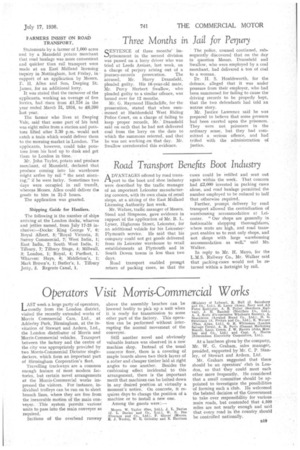Operators Visit Morris-Commercial Works
Page 29

If you've noticed an error in this article please click here to report it so we can fix it.
LASTLAST week a large party of operators, from the London district, visited the recently extended works of Morris Commercial Cars, Ltd., at Adderley Park, Birmingham, at the invitation of Stewart and Ardern, Ltd., the London distributor of Morris and Morris-Commercial vehicles. Transport between the factory and the centre of the city was appropriately provided by two Morris-Commercial Dictator singledeckers, which form an important part of Birmingham Corporation's fleet.
Travelling trackways arc a common enough feature of most modern factories, but certain novel arrangements at the Morris-Commercial works impressed the visitors. For instance, individual trolleys can be run on to short branch lines, where they are free from the inexorable motion of the main conveyer. This system permits various units to .pass into the main conveyer as required.
Sections of the overhead runway above the assembly benches can be lowered bodily to pick up a unit when it is ready for transmission to some other part of the factory. This operation can be performed without interrupting the normal movement of the conveyer.
Still another novel and obviously valuable feature was observed in a new machine shop. Instead of the usual concrete floor, there is a covering of maple boards above two thick layers of a softer and cheaper timber laid at right angles to one another. Besides the cushioning effect incidental to this arrangement, there is the important merit that machines can be bolted down in any desired position at virtually a moment's notice. On concrete, it requires days to change the position of a machine or to install a new one.
Among the guests were:—
Messrs. W. Taylor (Oxo, Ltd.), J. L. Davies • 4J. L. Davies and Co., Ltd.), W. E,. Dee (Courage and Co., Ltd.), F. Glover (Messrs. R. J. Weeks), W. E. Grindley and E. Harrison (Ministry of Labour), H. Hall )J. Sainsbury and Co., Ltd.), H. Lacey (Army, Navy and Air Force Institute), A. B. Potter (Southern Railway), J. II. Randell (Distillers Co., Ltd.), A. A. Scott (Co-operative Wholesale Society), A. Shackleton (Aerated Bread Co., Ltd.), H. (I. Sweetruan A. Prohyn and Co.. Ltd.), H. WatneY (Thos. Allen, Ltd.). G. H. Whiteman (London Salvage Corps), A. H. Pavia (Cement Marketing Board), Lieut. Comm. J. W. Havers (John Mowlem and Co., Ltd.) and Capt. A. Thistie (Edmondson Electricity Corporation, Ltd.).
At a luncheon given by the company, Mr. W. G. Graham, sales manager, presided, supported by Mr. C. P. Stanley, of Stewart and Ardern, Ltd.
Mr. Graham suggested that there should be an operators' club in London, so that they could meet each other more frequently. He considered that a small committee should be appointed to .investigate the possibilities of forming such a club. He welcomed the belated decision of the Government to take over responsibility for various , main roads, but contended that 4,500 miles are not nearly enough and said that every, road in the country, should be .controlled nationally.




















































































